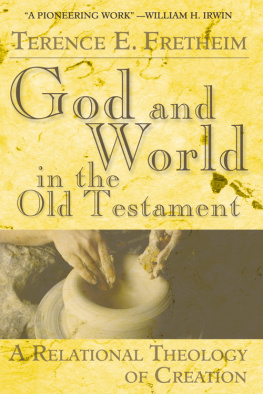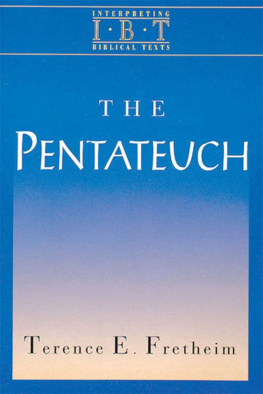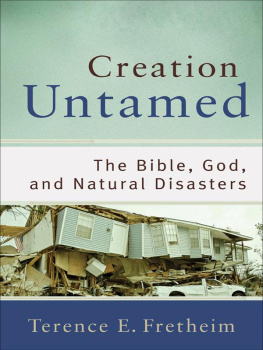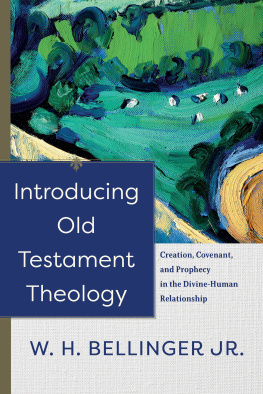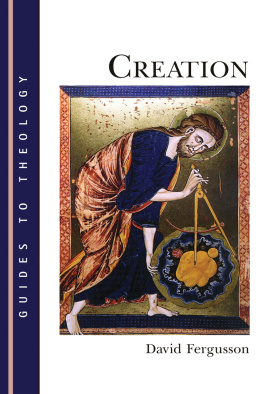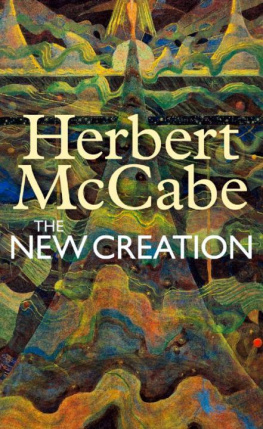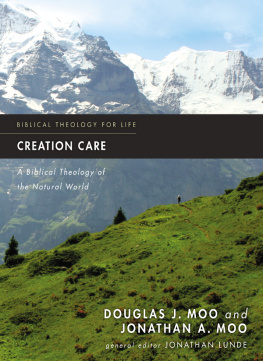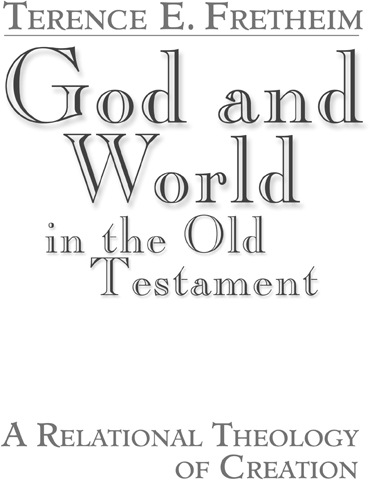Abingdon Press
Nashville
GOD AND WORLD IN THE OLD TESTAMENT
A RELATIONAL THEOLOGY OF CREATION
Copyright2005 by Abingdon Press
All rights reserved.
No part of this work may be reproduced or transmitted in any form or by any means, electronic or mechanical, including photocopying and recording, or by any information storage or retrieval system, except as may be expressly permitted by the 1976 Copyright Act or in writing from the publisher. Requests for permission can be addressed to Abingdon Press, P.O. Box 801, 201 Eighth Avenue South, Nashville, TN 37202-0801, or e-mailed to permissions@abingdonpress.com.
This book is printed on acid-free paper.
Library of Congress Cataloging-in-Publication Data
Fretheim, Terence E.
God and world in the Old Testament : a relational theology of creation Terence E. Fretheim.
p. cm.
Includes bibliographical references and indexes.
ISBN 0-687-34296-1 (binding: adhesive, perfect : alk. paper)
1. CreationBiblical teaching. 2. Bible. O.T.Theology. 3. Bible. O.T.Criticism, interpretation, etc. I. Title.
BS1199.C73F74 2005
231.7'65dc22
2004020007
All scripture quotations unless noted otherwise are taken from the New Revised Standard Version of the Bible, copyright 1989, Division of Christian Education of the National Council of the Churches of Christ in the United States of America. Used by permission. All rights reserved.
The scripture quotation marked REB is from the Revised English Bible Oxford University Press and Cambridge University Press 1989.
The scripture quotation marked RSV is from the Revised Standard Version of the Bible, copyright 1946, 1952, 1971 by the Division of Christian Education of the National Council of the Churches of Christ in the United States of America. Used by permission. All rights reserved.
Chapter 5 is adapted from "Law in the Service of Life: A Dynamic Understanding of Law in Deuteronomy" by Terence E. Fretheim, first published in A God So Near: Essays on Old Testament Theology in Honor of Patrick D. Miller, edited by Brent A. Strawn and Nancy R. Bowen; Winona Lake, Indiana: Eisenbrauns, 2003.
Portions of chapter 6 are adapted from "The Character of God in Jeremiah" by Terence E. Fretheim, first published in Character and Scripture: Moral Formation, Community and Biblical Interpretation edited by William P. Brown. Copyright 2002 by the Wm. B. Eerdmans Publishing Company.
Portions of chapter 6 are adapted from "The Earth Story in Jeremiah 12" by Terence E. Fretheim, first published in Readings from the Perspective of Earth edited by Norman C. Habel. Copyright 2000 by the Sheffield Academic Press. Reprinted by permission of The Continuum International Publishing Group.
Chapter 7 is an adaptation of "God in the Book of Job" by Terence E. Fretheim, first published in Currents in Theology and Mission (1999): 85-93.
Continued on page 398.
05 06 07 08 09 10 11 12 13 1410 9 8 7 6 5 4 3 2 1
MANUFACTURED IN THE UNITED STATES OF AMERICA
CONTENTS
FOREWORD
Creation has been a career-long concern of mine. My very first book was a study of Genesis 111; more than a decade ago the preparation of my NIB commentary on Genesis solidified that interest; and several articles along the way have sought to draw out that conversation. I have noted along the way that creation was a sorely neglected theme in Old Testament studies.Yet, it took some time before I fully realized that creation is a much more fundamental substratum of Old Testament theological reflection than most scholars imagine. And so I have thought it especially important to move beyond the creation accounts and seek to discern the depth and breadth of creational thought across the canon. Many more texts and traditions could have been drawn into the conversation, but I must leave that task for others to pursue.
This volume would not have been completed without the help of many persons. I wish to express my appreciation to students at Luther Seminary, who have interacted over the years with this material in earlier forms. Gratitude is also due to several colleaguesPaul Sponheim, Diane Jacobson, and Frederick Gaiserwho read all or portions of this material along the way. I am also grateful to the administration and board of directors of Luther Seminary for granting a leave of absence in order to complete this work. The encouragement of editors at Abingdon PressGreg Glover and Kathy Armistead especiallyhas been invaluable.
A special thanksgiving is extended to my wife, Faith, for her unfailing support along the way. I dedicate this volume to our three grandchildrenKelly, Shannon, and Emrewonderful creations who came to life over the course of time that this book was written. Thanks be to God.
Terence E. Fretheim
INTRODUCTION
T he importance of creation has often been underestimated by church and academy. Indeed, we can speak of the "marginalization of creation" in biblical and theological study over the course of much of the twentieth century (and before). Only in the last generation or so have significant efforts been made to recover a proper role for creation in biblical-theological reflection. The purpose of this volume is to contribute to this emerging conversation from an Old Testament theological perspective.
The causes of the marginalization of creation are many and complex. Certainly and most basically, an anthropocentrism has been at work in pervasive ways. Also, often cited are various cultural-social-political realities. Such an influence can be observed in the 1936 seminal article on creation by Gerhard von Rad, which at least in part reflects those theological efforts concerned to respond to "natural" emphases of national socialism in Germany. This article, with its subordination of creation to redemption, has been remarkably generative of further reflection on creation in the Old Testament, both positively and negatively. But the factors contributing to the neglect of creation among biblical scholars have been much more wide-ranging than the key factors that grounded von Rad's concern. One could cite the following trajectories of reflection that have diminished the place of creation:
(1) a focus on history, particularly salvation history, at the expense of nature; indeed, creation has been seen as being in the service of Israel's history;
(2) the association of creation with the cosmologies of Canaanite and other ancient Near Eastern religions, often negatively perceived to be syncretistic "nature religions" and hence at odds with Israel's most basic theological commitments;
(3) a relinquishment of the study of nature to the scientists, not least in view of the controversies generated by creationists;
(4) various theological perspectives (from deism to radical transcendence to absolute sovereignty) that remove God from too close a brush with the continuing life of the created order, raising questions as to whether God was actually engaged with life in the real world;
(5) an existentialism that tends to see all of reality from the perspective of human existence;
(6) a political theology centered on the liberation of the human to the neglect of the nonhuman;
(7) a theology of the word where preaching and the administration of the sacraments are so sharply focused on the human and the salvation of the human;
(8) an emphasis on the spiritual and otherworldly dimensions of religious life to the neglect of the bodily and earthly dimensions of spirituality;

